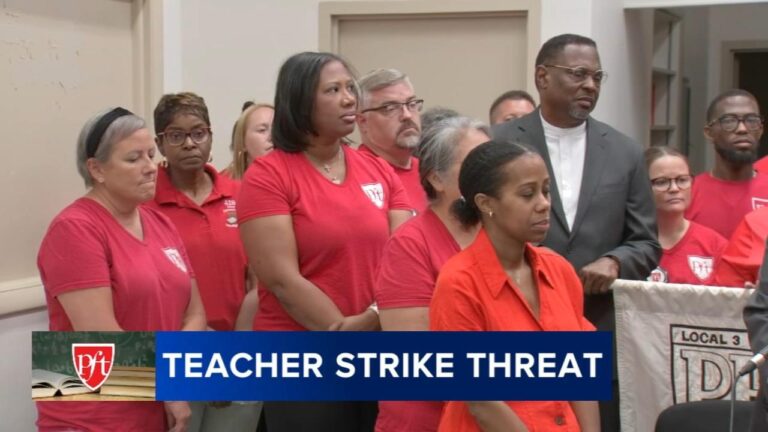Philadelphia Educators Gear Up for Strike Amid Contract Negotiation Deadlock
Teachers in Philadelphia’s public schools are increasingly signaling their readiness to initiate a strike as contract talks with city officials stall. Union leaders assert that unresolved issues surrounding compensation, classroom overcrowding, and workplace conditions have pushed educators to consider collective action. This looming strike poses a significant threat to the continuity of the academic year, intensifying the urgency for both parties to find common ground.
Core demands driving the potential strike include:
- Substantial salary adjustments that reflect current inflation trends
- Improved health and safety measures across all school facilities
- Increased investment in support personnel and educational resources
- Commitments to expanded professional growth and training programs
| Negotiation Topic | Union Proposal | City’s Offer |
|---|---|---|
| Wage Increase | 7% raise annually | 3% raise annually |
| Classroom Capacity | Cap at 20 students | No proposed changes |
| Support Staff Expansion | Add 200 staff members | Add 50 staff members |
Underlying Factors Prompting Philadelphia Teachers Toward Strike Action
Educators in Philadelphia are rallying in response to a mix of persistent challenges and emerging pressures that have heightened dissatisfaction within the school system. Central to their grievances is the demand for enhanced learning environments, which includes reducing class sizes and bolstering support staff numbers—measures they argue are essential for effective teaching and student success. Furthermore, calls for fairer compensation and benefits reflect concerns about the widening gap between stagnant salaries and escalating living expenses, underscoring financial insecurity as a key motivator behind the unrest.
In addition to pay and working conditions, teachers stress the critical need for expanded mental health services for both students and staff, especially given the increased emotional and psychological demands in the aftermath of the COVID-19 pandemic. Other frequently cited issues include:
- Shortages of classroom supplies and outdated technological tools
- Insufficient support for special education initiatives
- Limited teacher involvement in decision-making processes affecting schools
- Excessive workloads due to extended hours and administrative responsibilities
| Concern | Teacher Perspective | Potential Consequences |
|---|---|---|
| Class Size | Overcrowded classrooms | Less personalized student attention |
| Compensation | Wages lagging behind inflation | Financial hardship for educators |
| Mental Health | Insufficient counseling resources | Increased stress and negative school climate |
| Resources | Obsolete materials and technology | Reduced teaching effectiveness |
Consequences of a Teachers’ Strike on Students and the Wider Community
A strike by Philadelphia’s educators would have immediate and far-reaching effects on the school system, impacting students, families, and the community at large. Students could experience interruptions in their academic progress, including missed lessons and delays in receiving feedback on assignments. Parents may face challenges securing childcare or supervision during school hours, adding stress to already busy households. While the district has indicated plans to maintain limited operations, many academic and extracurricular programs are likely to be suspended.
Operational disruptions would extend to several key areas, such as:
- Lower student attendance: Schools may close or operate with reduced capacity, causing fluctuating attendance rates.
- Interrupted meal services: Programs providing breakfast and lunch to students in need could be disrupted.
- Administrative slowdowns: Processing of records, transportation logistics, and other essential functions may be delayed.
| Area Affected | Expected Impact | Duration |
|---|---|---|
| Instructional Time | Complete halt of classroom teaching | For the length of the strike |
| Student Support Services | Limited or no access to counseling and assistance | Indefinite |
| Meal Programs | Disruptions to free and reduced-price meal availability | Dependent on strike duration |
Approaches to Break the Deadlock and Prevent a Strike
Maintaining open and honest communication is essential to defuse tensions between Philadelphia’s education officials and teacher representatives. Creating neutral forums where all voices are genuinely heard can foster mutual understanding. Utilizing active listening and empathy helps uncover shared interests, which can serve as a foundation for gradual agreements and reduce the risk of escalation. Transparency regarding budget constraints, school conditions, and contract parameters also builds trust, steering discussions toward cooperative problem-solving rather than confrontation.
Moreover, engaging independent mediators or arbitrators with expertise in labor negotiations can offer unbiased perspectives that help break prolonged impasses. Negotiators might also adopt flexible, interest-based negotiation techniques, focusing on underlying needs rather than fixed positions. Effective strategies include:
- Collaborative brainstorming sessions to generate innovative solutions
- Phased agreements that tackle less divisive issues first
- Establishing firm timelines to sustain momentum and avoid drawn-out delays
These structured approaches not only increase the likelihood of reaching a resolution but also contribute to crafting durable agreements that minimize future disruptions to education.
Final Thoughts on the Philadelphia Teachers’ Strike Situation
As Philadelphia’s educators prepare to potentially strike, the city confronts mounting pressure to resolve deep-rooted issues related to salaries, classroom environments, and resource allocation. With negotiations at a critical juncture and tensions escalating, the outcome will profoundly affect students, families, and the broader educational community. All stakeholders are watching closely as both sides strive to find a path forward that ensures stability and quality education for Philadelphia’s youth.








